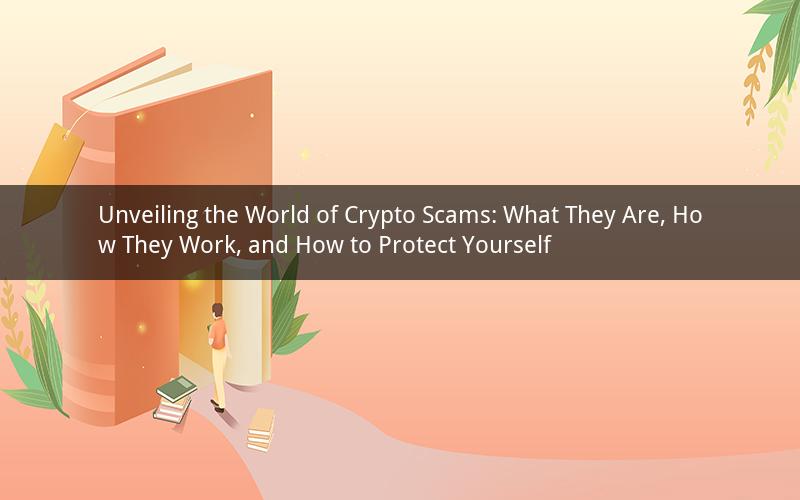
In the rapidly evolving world of cryptocurrencies, the term "crypto scam" has become increasingly prevalent. As the popularity of digital currencies continues to soar, so does the number of fraudulent activities targeting unsuspecting individuals. This article delves into the intricacies of crypto scams, exploring their nature, methods, and the best ways to safeguard yourself against them.
What is a Crypto Scam?
A crypto scam refers to any fraudulent activity that involves cryptocurrencies. These scams can take various forms, from Ponzi schemes and phishing attacks to fake exchanges and Ponzi schemes. The common denominator in all these scams is the exploitation of individuals' trust in the crypto market.
Types of Crypto Scams
1. Phishing Attacks
Phishing attacks are one of the most common types of crypto scams. These attacks involve sending fraudulent emails or messages that appear to come from reputable sources, such as exchanges or wallets. The goal is to trick individuals into providing their private keys or personal information, which can be used to steal their cryptocurrencies.
2. Ponzi Schemes
Ponzi schemes are fraudulent investment scams that promise high returns to investors. These schemes rely on the belief that new investors' money will be used to pay returns to earlier investors, creating the illusion of a legitimate business. In reality, Ponzi schemes are pyramid schemes that collapse when there are no new investors to sustain them.
3. Fake Exchanges
Fake exchanges are websites that mimic legitimate cryptocurrency exchanges to steal users' funds. These exchanges may offer attractive features and low fees, but they are designed to steal users' private keys or drain their wallets. Fake exchanges often operate for a short period before disappearing, leaving victims with no way to recover their funds.
4. Pump and Dump Schemes
Pump and dump schemes involve manipulating the price of a cryptocurrency by artificially inflating it through false information or hype. The scammers then sell their holdings at the peak price, leaving unsuspecting investors with massive losses. These schemes can be difficult to detect, as they often involve sophisticated manipulation of social media and forums.
5. Rug Pulls
Rug pulls are a type of scam where developers abandon a cryptocurrency project after its initial coin offering (ICO). This leaves investors with a worthless token, as the developers have no intention of developing the project further. Rug pulls can be difficult to detect, as they often involve legitimate-looking projects with active communities.
How to Protect Yourself from Crypto Scams
1. Educate Yourself
The best way to protect yourself from crypto scams is to educate yourself about the market and the various types of scams. Stay informed about the latest trends and news in the crypto world, and be wary of any investment opportunity that seems too good to be true.
2. Use Secure Wallets
Always use secure wallets to store your cryptocurrencies. Hardware wallets are considered the most secure, as they store your private keys offline. Avoid using centralized exchanges to store your funds, as they are more susceptible to hacking and theft.
3. Verify Sources
Before sharing any personal information or private keys, verify the source of the request. Be cautious of emails, messages, or calls that ask for your sensitive information. If you're unsure about the legitimacy of a source, contact the organization directly through their official channels.
4. Be Skeptical of High Returns
Be wary of investment opportunities that promise high returns with little to no risk. Remember that the crypto market is highly volatile, and any investment carries a certain level of risk. If an opportunity seems too good to be true, it probably is.
5. Stay Informed
Stay informed about the latest scams and fraudulent activities in the crypto market. Follow reputable news sources, join online forums, and participate in communities to stay updated on the latest developments.
Frequently Asked Questions (FAQs)
1. How can I identify a phishing attack in a crypto scam?
Answer: Phishing attacks often involve emails or messages that appear to come from reputable sources. Be wary of any request for your private keys, personal information, or urgent action. Always verify the source of the request before providing any sensitive information.
2. What should I do if I suspect I have fallen victim to a crypto scam?
Answer: If you suspect you have fallen victim to a crypto scam, report the incident to the relevant authorities and your cryptocurrency exchange or wallet provider. Document all relevant information, including the email or message you received, and any other evidence that may help in the investigation.
3. Are there any legal protections for victims of crypto scams?
Answer: Legal protections for victims of crypto scams vary by country and jurisdiction. In some cases, victims may be able to recover their funds through civil lawsuits or by working with law enforcement agencies. It's important to consult with a legal professional to understand your rights and options.
4. How can I avoid falling victim to a Ponzi scheme in the crypto market?
Answer: To avoid falling victim to a Ponzi scheme, be skeptical of investment opportunities that promise high returns with little to no risk. Conduct thorough research on the project and its team, and be wary of any red flags, such as lack of transparency or unrealistic promises.
5. What are some common red flags of a fake cryptocurrency exchange?
Answer: Common red flags of a fake cryptocurrency exchange include a lack of transparency, unrealistic fees, and a lack of regulatory compliance. Be cautious of exchanges that ask for your private keys or personal information, and always verify the legitimacy of the exchange through official channels.